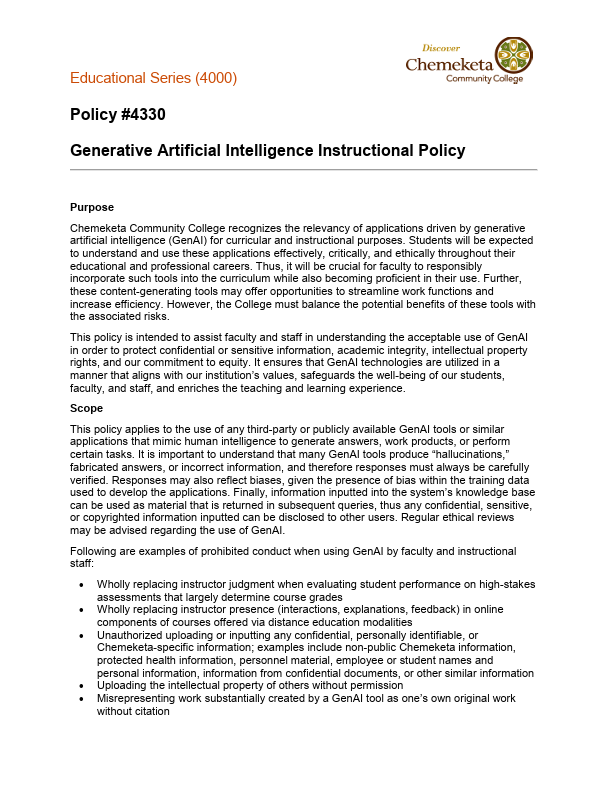Generative AI Policy & Ethics
To support faculty in navigating these evolving technologies, the Center for Academic Innovation is available to provide guidance, training, and resources to ensure that GenAI is used effectively and responsibly. Chemeketa Community College’s Generative Artificial Intelligence Instructional Policy (Policy #4330) establishes guidelines for the responsible integration of GenAI tools in curriculum and instructional activities. Recognizing both the opportunities and risks associated with these technologies, the policy underscores the necessity for faculty to critically and ethically utilize GenAI while maintaining academic integrity, intellectual property rights, and institutional values.
Chemeketa Syllabus Resources
Collaborative Syllabus Resoruces
- The Sentient Syllabus Project – examples of syllabus-appropriate text for use in “an era of AI.”
- AI-related classroom policies from various institutions and courses
Academic Integrity Syllabus Statement
We have updated the academic integrity syllabus statement to include additional information defining plagiarism as the unauthorized use of generative artificial intelligence. Please add this information to your syllabus.
Expand Syllabus Statement
Academic honesty is an important building block of any learning community. Students and instructors demonstrate academic honesty when they participate truthfully, fairly, and respectfully. Being dishonest in your academic work not only interferes with your personal growth as a learner, it has a negative impact on your class community.
Chemeketa takes academic dishonesty seriously. If you are found in violation of Chemeketa’s academic honesty policy (POL 5020), you may be subject to the disciplinary process as reflected in Chemeketa’s academic honesty procedure (PRO 5020) and the Student Rights and Responsibilities. Violations of academic honesty include but are not limited to plagiarism, cheating, falsification, tampering, and getting inappropriate assistance. Violations also include using any form of generative artificial intelligence (such as text, image, or code generators like ChatGPT or Bing Chat) to complete your assignments or exams for this class, unless I specifically allow it.
[If the use of generative AI is permitted, then add:] “I will make clear any approved use of generative AI on assignment instructions” …and follow up by providing clear guidelines for which tools are permitted, how they may be used, and for what reason.
To learn more about academic honesty, visit the Academic Honesty webpage: https://www.chemeketa.edu/students/student-rights-responsibilities/academic-honesty/
Suggested, optional addendum:Two of the main reasons students choose to cheat are pressure to do well and feeling overwhelmed. If you are experiencing anxiety and are overwhelmed to a degree that you are tempted to cheat, please communicate with me, a counselor, or a tutor to get help.
Educator Resources from Turnitin
Turnitin is Chemeketa’s plagiarism checker and is integrated into Canvas. While Turnitin and other plagiarism checkers may offer some AI analysis tools, Chemeketa’s license does not. Turnitin does, however, provide resources for educators to review assignments and discussion prompts for vulnerabilities to generative AI tools:

